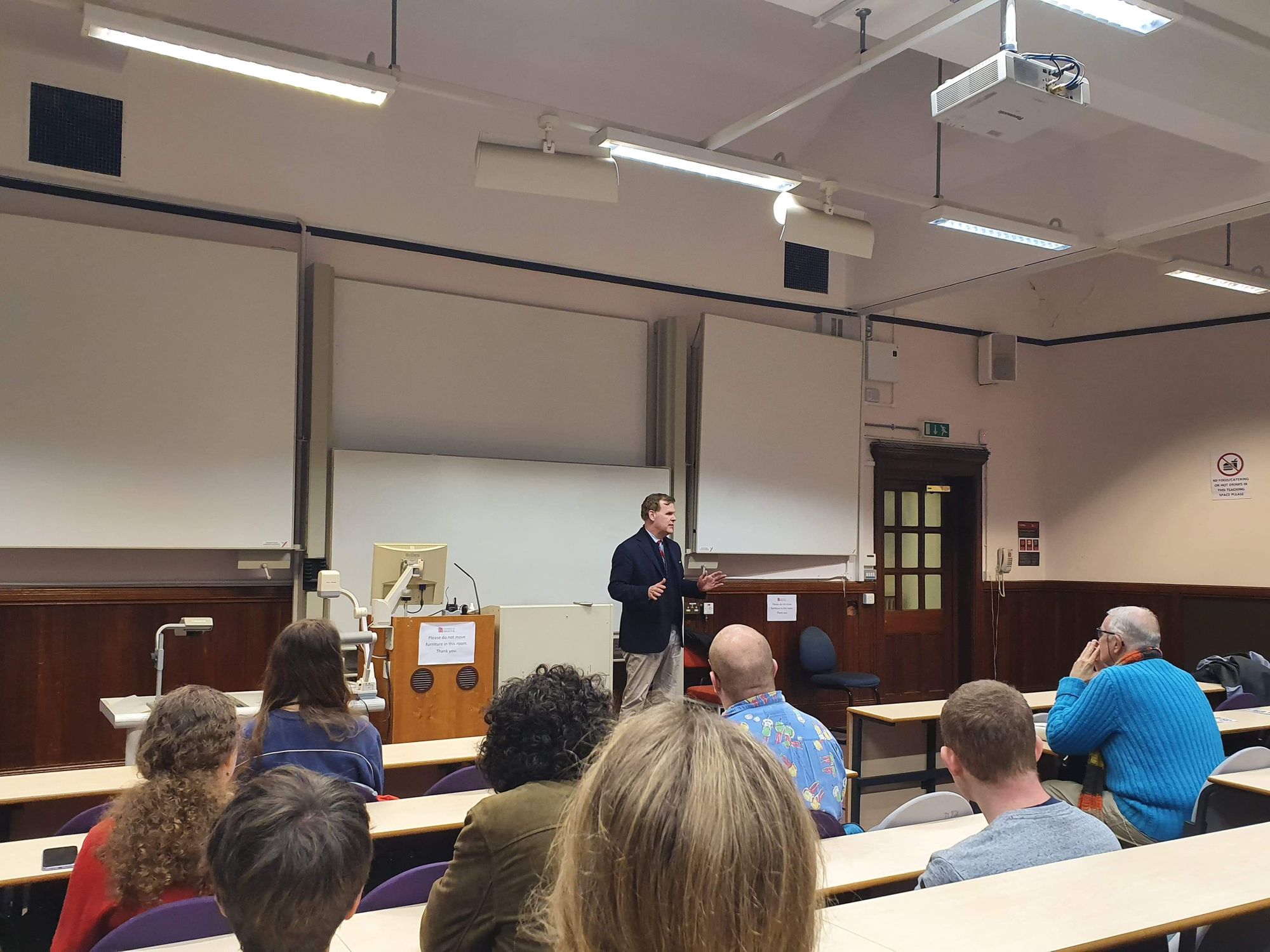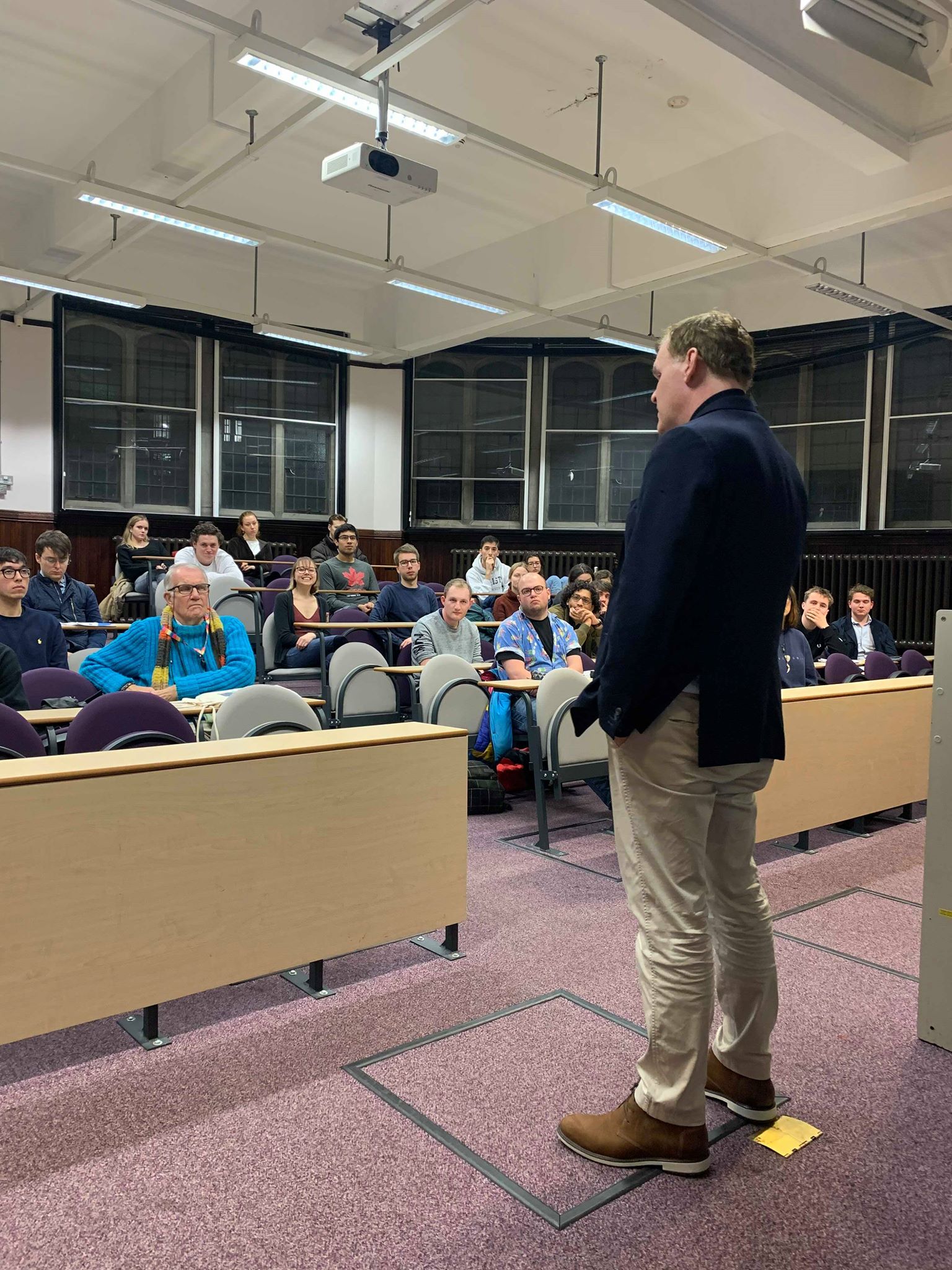By Robin Connolly, Features Editor
On tour as a volunteer with the Pinsker Center, a think tank who facilitate political discussions and talks at universities across the country, Epigram speaks to John Baird about his rise to the position of Foreign Minister in Canada, a role from which he resigned in 2015. Baird gave a talk with questions open to the floor at the end, jointly facilitated by UoB’s Middle East Forum, Conservative Society and Canadian Society.
Confession time - as John Baird walks into the room, I miss his first joke. I think everyone else does too, as he then smiles and says ‘don’t you guys know The Simpsons?’. The room has successfully been warmed up.
We are later told that he was warned off doing a Michael McIntyre-style entrance. A wise, but nevertheless disappointing decision.
Less formal, but just as well-spoken and informed as I expected, John Baird speaks, and is questioned, on Iran, who he describes as ‘the biggest threat to international peace and security today,’ the UK’s role on the international stage for peace negotiations with the Middle East and, of course, in true ‘Hello Magazine’ style, recent announcements made by the Sussexes.

The audience doesn’t hold back, with one person even asking him if he supported the President of the United States’ decision to take out Qasem Soleimani. Having said he opposes the death penalty; I am somewhat surprised when he describes it as the ‘right move. Tough call.’
John Baird speaks, and is questioned, on Iran, who he describes as ‘the biggest threat to international peace and security today’
However, when I settle down to speak to him, I am more interested to hear about the beginnings of his career than recent changes in current affairs. Baird entered parliament young, however I hadn’t realised quite how young until he told me that it was ‘two days after my 26th birthday.’
Having entered the political world firstly as president of the Conservative youth wing in Ontario province (which he emphasises is ‘more than a third of the country.’) As a student, he worked for a cabinet minister, before going on to work for him full time after graduation. ‘Then we had an electrical blow out in 1993. And then 18 months later, I was elected to the Ontario legislature.’
I really want to know whether he would advocate the career path he has taken to young people, to which he immediately, without hesitation, responds ‘absolutely,’ later on explaining ‘- it’s meritocracy!’ ‘If you work hard, you have good ideas and values and project that.’
Amazing to have John @Baird at Bristol Uni tonight discussing Iran and, of course, #MeghanAndHarry! Great turnout and questions. Thanks @PinskerCentre for their support. https://t.co/ASOvpQpaNc
— Rob Porter (@Robertrmdp) January 14, 2020
He explains how he believes that in the UK, as in Canada, there are ‘huge opportunities for young people.’ He cites how ‘in Parliament in Canada, we had one MP elected at 19 in 2011, with another member of Parliament elected this time in 2019, 21.’
This brings to mind those such as Nadia Whittome in the UK. MP for Nottingham East, she’s currently the ‘Baby of the House,’ aged 23. Baird can relate to this – ‘for a while, I was the youngest minister federally as well,’ ‘I was 36.’
I think of some of the 36 year olds I know now, and think of Nadia, just 3 years older than me currently - I can't straight away imagine any of us holding political office with much success. Did people take him seriously?
‘Look, I faced no barriers. Being a 25-year-old when I was presenting myself as a candidate, I was really worried about it. But people listened to my views and when I made an assessment. I had skills to represent them in Parliament.’
Baird is an advocate for open dialogue in universities. He explains to me how it was at talks like his tonight where he heard ‘people from around the world, people I agreed with, people I disagreed with.’ To him, debate between students is of the upmost importance. ‘I think it opens your mind. And you learn you have your views and values, your principles challenged. And that's an interesting, important thing.’
Having said he opposes the death penalty; I am somewhat surprised when he describes (the death of Qasem Soleimani) as the ‘right move. Tough call.’
He remembers how, as a student, studying politics and then history, in seminars he ‘loved you know, debating the salient issues of the day, learning, changing your view.’
He even fondly talks about two of his previous seminar tutors, who were important in the formation of his debating abilities. ‘One was a world eminent Marxist. And one was a Communist. And I learned a lot from them. I didn't agree with them and their conclusions, but they challenged my own assumptions.’

When he tells me that ‘I always worry when I see debate being restricted on campus to say one side is right and one side is wrong,’ it feels relevant. Less than a year ago, the University of Bristol re-affirmed its commitment to freedom of speech after 200 people signed an open letter calling for an event to be cancelled that had the potential for transphobic sentiment and language. The free speech debate is definitely still alive and present within discussions at our university.
| Students protest Free Speech event due to guest speaker
| Free speech event cancelled following 'security concerns'
He reminds me how ‘fundamental things about universities are learning - education and learning,’ and that we can often learn through debate, through negotiation, through listening to others.
Along with listing ‘economic opportunity,’ living ‘in a world that has peace and stability,’ ‘human rights,’ and the ‘environment,’ as political and international concerns for young people, it seems John Baird has left me with a lot to think about.
However, he has also provided some reassurance that young people in politics can, will and should be listened to and taken seriously.
Featured: Epigram / Oliver Cohen
What are your opinions on young people entering political careers? Let us know in the comments!








